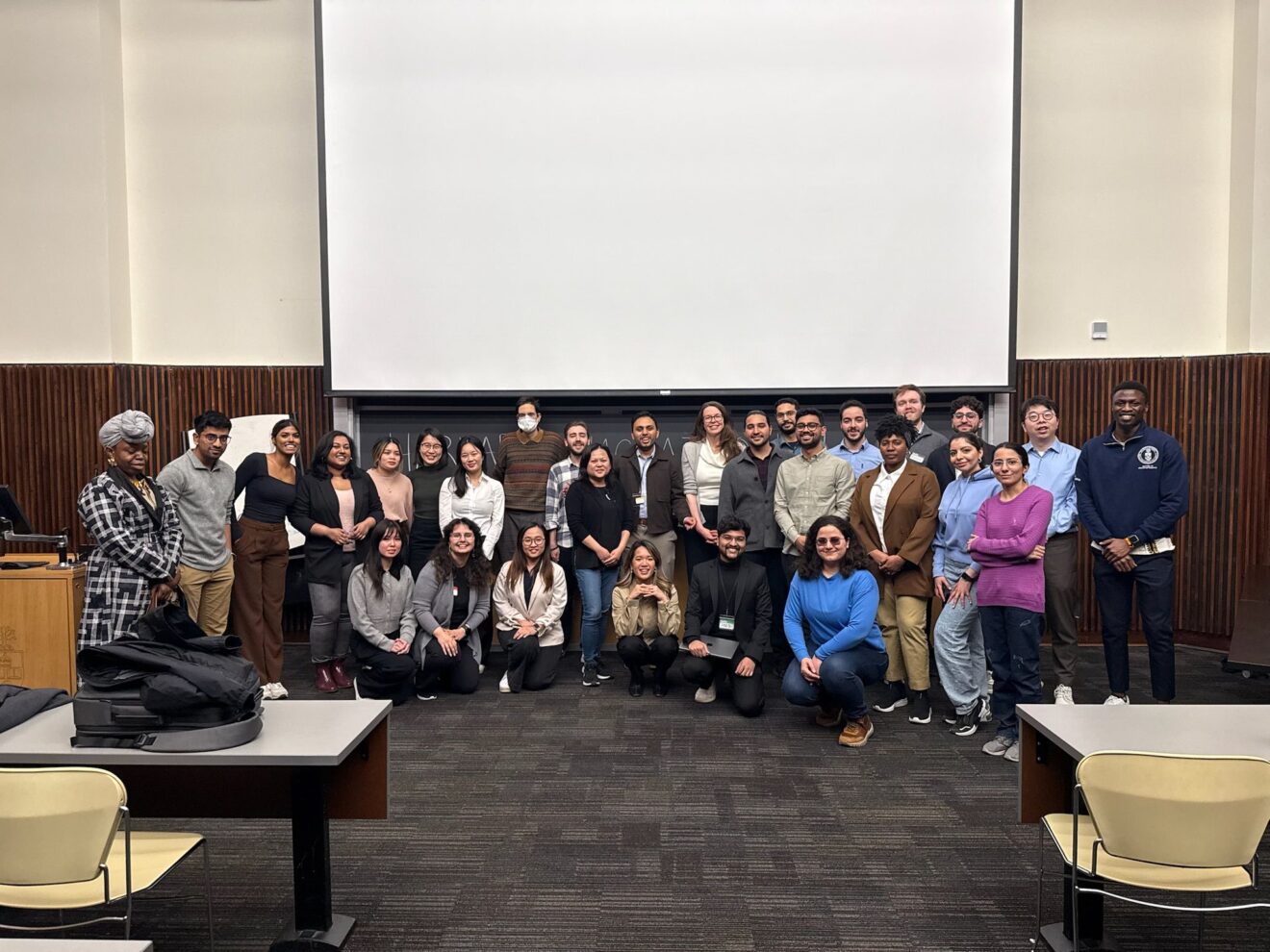As AI continues to transform the healthcare landscape, the demand for innovative solutions driven by strong partnerships grows ever more critical. In recent years, AI hackathons have gained traction as a way to foster innovation and bring together creative thinkers to solve complex healthcare challenges.
By: Marielle Boutin

Showcasing this in action, the Dalla Lana School of Public Health played host to the Harvard x UofT Health Systems AI Hackathon on April 11-12, 2025. This year marked the sixth iteration of the landmark event, with this year being a collaboration between the Harvard Health Systems Innovation Lab in Boston and IHPME. Over 3500+ participants from around the globe came together to join U of T’s hub in pitching innovative, AI-driven solutions to real-world healthcare challenges under the theme of “Building High-Value Health Systems: Leveraging Artificial Intelligence.”
The driving force behind this year’s event was the Artificial Intelligence for Health Systems Student network (AIHSSN), a student-led group at IHPME focused on transforming health systems through innovation and leadership. AIHSSN was co-founded by Senthujan Senkaiahliyan, a graduate of the Master of Health Administration program, and Ashley Girgis, a graduate of the Master of Health Informatics program.
“We were driven by a shared belief,” says Senkaiahliyan. “That the next generation of health system leaders and researchers should have early, meaningful exposure to artificial intelligence, not just as a technical skillset, but as a critical lens for shaping the future of healthcare delivery and policy.”
Senkaiahliyan was motivated to host this year’s event following his experience supporting the 2024 Boston Hub, hosted by The Harvard Health Systems Innovation Lab at the Harvard School of Public Health, where he is also a research scholar.
Driven by the goal of promoting health system reforms through meaningful collaboration, Senkaiahliyan brought the AI Hackathon to U of T, with the help of Co-Lead Dr. Shawna Novak, a faculty member at the Harvard Medical School and the Temerty Faculty of Medicine, and winner of the 2024 Boston Hub.
“At its best, this hackathon was a living laboratory, not only for testing AI-driven solutions, but for practicing the kind of interdisciplinary, inclusive, and values-driven collaboration that our health systems urgently need, says Dr. Novak. “It reminded us that innovation is not just about technology; it’s about who we include in the room, whose problems we prioritize, and how we translate bold ideas into systems-level impact.”
The event was sponsored by Dean Adalsteinn Brown from the Dalla Lana School of Public Health (DLSPH) and Professor Erica Di Ruggiero through the Centre for Global Health. Crucial mentorship also came from Dr. Bo Wang and his AI team at UHN.
The judging panel featured a mix of internal and external expertise, including IHPME faculty member Tran Truong and Sarah Nayani, Program Manager for Artificial Intelligence for Public Health at DLSPH.
The result was an energetic display of collaboration, with participants driven by a shared passion to reimagine healthcare innovation from a human-centered perspective.
“The room was filled with energy and a can-do spirit as teams worked through their challenges,” says Lily (Nway Nway) Aung, a recently appointed lead for the AIHSSN and member of this year’s winning Hackathon team.
“The energy and passion in the room were contagious throughout the event. There was a buzz of focus and creativity followed by a mix of nerves and excitement,” adds Syed Muhammad Ibne Zulfiker, another AIHSSN lead and graduate student in the Health Systems Research program.
According to the planning team, the event was more than just a competition – it was a vibrant experience that provided a platform for diverse creative thinkers to come together and reimagine health system design through AI.
“It really went to show how proximity can be an important catalyst for innovation, with participants coming from the Schwartz Reisman Institute for Technology and Society, the Vector Institute, MaRS, UHN, and more” says Senkaiahliyan. “Especially in this pro-virtual era, the overall hackathon reminded us how community can feel like, especially when you all share a common desire and passion.”
Beyond the energetic buzz of collaboration that was central to the AI hackathon experience, the event also underscored the powerful role students play in shaping the future of healthcare innovation.
“As student leaders, it’s an honour to be able to champion the values of collaboration, creativity, and inclusion and witness firsthand the incredible potential of AI in transforming health systems,” says Zulfiker.
This spirit of leadership and innovation is also reflected in the growth of AIHSSN. What began as a small group focused on knowledge dissemination and resource sharing has transformed into a larger platform capable of running high-impact initiatives, securing crucial funding, and supporting the professional development of students and early-career researchers. Now, the network is hoping to build on this momentum and become national.
“Our hope is that AIHSSN becomes a cornerstone in building the talent and thought leadership needed to responsibly integrate AI into health systems,” says Senkaiahliyan. “We want people who read this to be inspired, not just to learn more, but to invest in the mission, to mentor, to collaborate, and to help us grow a network that’s shaping the future of healthcare.”
This marks the beginning of a wave of innovation, with the next generation ready to bring their ideas to life. All they need, according to Senkaiahliyan, is space to get their hands dirty and the confidence to overcome self-doubt.
“So many enter thinking, ‘I can’t do this’ or ‘this is too hard,’ but with the right support, mentorship, and community, they realize they can. That kind of shift is what makes these spaces so powerful.”
Related News

Sign up for IHPME Connect.
Keep up to date with IHPME’s News & Research, Events & Program, Recognition, e-newsletter.
Subscribe to Connect Newsletter
Get in Contact
Communications
Marielle Boutin
Email Address: ihpme.communications@utoronto.ca





